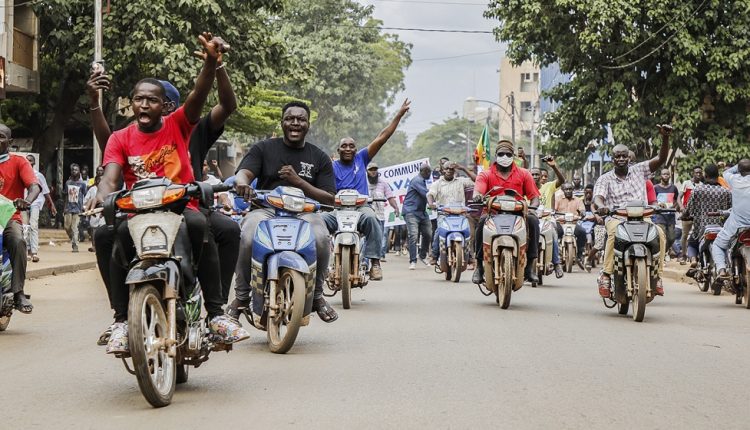Mali’s president resigns after being arrested in military coup
By Ruth Maclean
DAKAR, Senegal — The president of Mali resigned late Tuesday (18) hours after he was arrested by military officers who staged a coup following months of protests, further destabilizing a West African country that has been battling a violent insurgency.
President Ibrahim Boubacar Keïta went on State television around midnight and said the national assembly and the government would be dissolved as a consequence of his departure. He and his prime minister, Boubou Cissé, had been arrested along with other government officials earlier in the day.
“For seven years I had the happiness and the joy of trying to straighten out this country,” Keïta said, wearing a white cap and robes, his speech muffled by a surgical mask. “I don’t want any blood to be shed to keep me in my position.”
The rebellion came amid a growing protest movement driven by charges that Keïta had stolen a parliamentary election in March and installed his own candidates. Demonstrators have also been angered by the government’s failure to address corruption and the violence by Islamic insurgents and other armed groups that has plagued the country for eight years.
The streets of Bamako, the capital, exploded with jubilation and gunfire earlier in the day. At Independence Square in the middle of town, hundreds of people gathered in what appeared to be a spontaneous demonstration, pumping their fists, blowing vuvuzelas and cheering the soldiers who drove past, firing their weapons.
‘Goodbye, IBK’” read a placard, using Keïta’s nickname. ‘Long live Mali’.
And with the music turned up loud, rifles bristling from the windows, people riding in a column of military vehicles broadcast their actions live on Facebook.
Mali has been in crisis since 2012, when rebels and jihadis took control of the country’s north. Despite the intervention of foreign forces, including French troops, US military advisers and UN peacekeepers, the unrest has spread.
Led by a coalition of politicians, civil society leaders and a popular imam, Mahmoud Dicko, Malians rose up to demand Keïta’s resignation, descending by the thousands onto Bamako’s streets. In mid-June, security forces shot and killed at least 11 protesters in violence that further drove the protest movement.
The turmoil represented a sharp change in fortunes for the once-popular Keïta, who won a landslide election in 2013 in the wake of a military coup.
The arrests were confirmed Tuesday evening by one of Keïta’s former bodyguards, Ali ‘Banou’ Mariko, who told local radio stations, “We’ve just arrested the president of the republic together with his Prime Minister Boubou Cissé and his campaign aide.”
They were taken to a military camp in Kati, 10 miles outside Bamako, where the mutiny began early Tuesday, Mariko said. Pictures of what appeared to be the president and the prime minister getting out of SUVs at the camp — the president dressed in his trademark white robes and the prime minister in a suit and surgical mask — were circulated among local journalists and on social media.
They were not the only ones arrested. A government official, who did not want to be identified because of the unstable situation, said in an interview that he saw soldiers arrive in pickup trucks and arrest the finance minister in his office Tuesday morning. Local media also reported that the president of the national assembly was taken from his home.
The prime minister, Cissé, had released a statement Tuesday, before his arrest, calling for “reason and patriotism, and for the guns to be silenced”. There was no problem that could not be solved by dialogue, he said, taking a conciliatory tone.
“The government calls for appeasement and is available to engage in fraternal dialogue in order to dispel any misunderstandings,” the statement read.
The Malian crisis grew partly out of the Libyan one. After the fall of Moammar Gadhafi in 2011, hundreds of heavily armed Malian rebels who had fought for the Libyan leader returned home and attacked northern towns.
In the chaos that followed, a military officer led a coup, overthrowing President Amadou Touré a month before elections were to be held.
Keïta came to power a year and a half later, winning an August 2013 election by an overwhelming margin. He was a popular figure then, a former prime minister and parliamentary speaker seen by Mali’s youth as an honest and fair man who could get things done and who had good contacts among rich donors.
But as his tenure went on, security became more elusive in the country, with its central regions destabilized by Islamic and inter-communal violence. The military has been accused of abusing civilians while fighting the insurgents, and peace talks have repeatedly failed.
The violence has spread to Burkina Faso and Niger, and the whole region has been affected by the fallout.
Keïta’s perceived failure to protect Malian citizens was a major factor in his fall from grace, analysts said. But what sent Malians, and in particular the residents of Bamako, into the streets was a long-delayed parliamentary election in March, in which Keïta was accused of installing his preferred candidates instead of those who had won.
Despite the coronavirus pandemic, and the killing of protesters by security forces in June, demonstrations ballooned, with people turning out week after week to demand Keïta’s resignation
Attempts at mediation in the last month by regional leaders, led by former Nigerian President Goodluck Jonathan, failed to dampen the protest movement.
ECOWAS, the union of West African nations, issued a statement asking for sanctions to be imposed on the coup plotters, suspending the country from all its decision-making bodies and closing the land and air borders with Mali. ECOWAS said it would send a delegation to Mali.
UN Secretary-General Antonio Guterres called for the release of those arrested.
-New York Times


